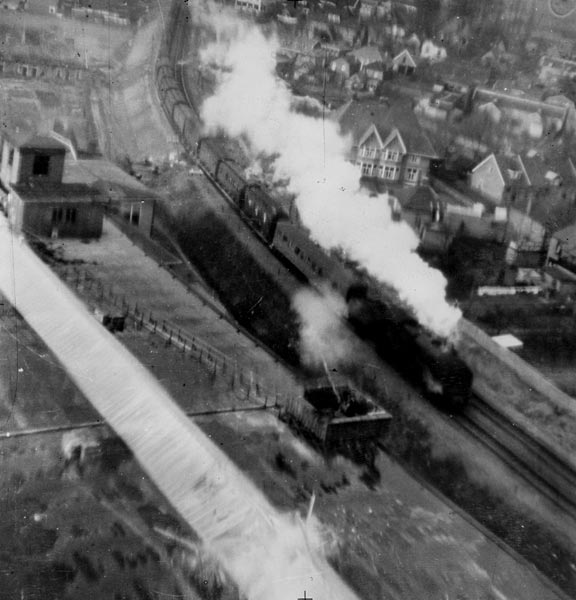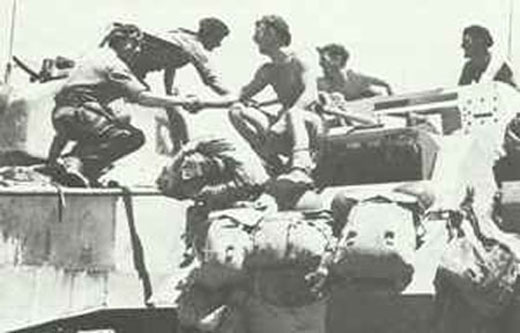Air Operations, Aleutians
4 28th Composite Bomb Group B-25s, 8 343rd Fighter Group P-38s, and 22 P-40s mount 5 separate attacks against Kiska.
[Air Operations, East Indies
V Bomber Command B-25s attack several targets on Timor.
[Air Operations, Europe
BOMBER COMMANDDaylight Ops:
- 8 Mosquitos bomb and engineering factory at Hengelo and railway workshops at Malines. 2 Mosquitos are lost.
Bombing Targets at Abbeville |
 |
- 46 aircraft lay mines off Texel, Britanny and the Biscay ports.
- 1 Stirling and 1 Wellington are lost.
Air Operations, Mediterranean
- P-38 pilots of the 82nd Fighter Group's 95th Fighter Squadron intercept an Axis air convoy over the Straits of Sicily and down 20 Ju-52s, 2 Ju-88s, and 5 Luftwaffe fighters between Marsala, Sicily and Cap Bon, Tunisia about 0800 hours.
- At 1030 hours, P-38 pilots of the 82 Fighter Group's 96th Fighter Squadron down 5 Ju-52s near Marettimo Island.
Air Operations, New Guinea
- 43rd Heavy Bombt Group B-17s attack Finschhafen and Lae.
- 3 90th Heavy Bomb Group B-24s mount individual attacks against Finschhafen.
- 22 D3A 'Val' dive bombers, escorted by 72 A6M Zeros, attack the Allied base at Oro Bay, where they sink two Allied merchant ships and damage an Australian corvette. P-38s and P-40s from the 8th, 35th, and 49th Fighter groups down 7 'Vals' and 11 Zeros near Oro Bay between 1215 and 1230 hours.
Air Operations, Sicily
NASAF B-17s attack Marsala and Trapani.
[Air Operations, Solomons
- XIII Bomber Command B-17s attack the Ballale and the Kahili airfield on Bougainville.
- AirSols F4Fs, F4Us, and P-38s strafe gun emplacements around Rekata Bay.
Air Operations, Tunisia
- NASAF B-17s attack Tunis.
- NAAF B-26s attack Oudna Airdrome.
- Naaf B-25s attack Ste.-Marie du Zit Airdrome.
- IX Bomber Command B-25s attack Axis motor vehicles and troops concentrations near Sfax.
- NATBF A-20s and NATAF fighter-bombers attack German Army motor columns around Enfidaville.
Axis Planning
The Salzburg conference between Hitler and Mussolini ends. Göring notes in his diary: 'The Führer told me that in these four days the Duce has got back to his best form ... The Duce fully understands that he has no alternative but to conquer or die with us.'
[Battle of the Atlantic
- The British destroyer Beverley, damaged 2 days previous in a collison with the British steamer Cairnvalona, is sunk by U-188 southwest of Iceland with the loss of 151 members of her crew. 5 survivors are picked up by the British corvette Clover.
- The US freighter Edward B. Dudley (7177t) is torpedoed and sunk by U-615 in the North Atlantic. Those survivors of the 42-man crew and the 25-man Armed Guard who managed to lower boats are never recovered.
- The US freighter James W. Denver (7200t), straggling from Convoy UGS-7, is torpedoed ans sunk by U-195 in the North Atlantic. All hands, 42 crewmen, 1 passenger and 25 Armed Guard sailors, survive the loss of the ship and set sail for the coast of Africa.
- The US freighter Matt W. Ransom (7177t), steaming in Casablanca-bound Convoy UGS-6A, is mined. 42 crewmen, 2 passengers and 28 Armed Guards abandon ship and are rescued by submarine chasers PC-471 and PC-481.
Eastern Front
The Germans are now planning in earnest for an attack on the Kursk salient. The idea is too obvious for any hope of surprise, and so it is clear that a massive attack must be prepared if there is to be any chance of success. The German generals are divided in their opinions. Gunther von Klüge, commanding Army Group Center, and Kurt Zeitzler and Wilhelm Keitel of the General Staff are in favor. Heinz Guderian, now Inspector-General of Armored Troops, and Erich von Manstein who in fact originally suggested the idea, are opposed to it.
GERMAN COMMANDZeitzler outlines a plan calling for the recently formed Kursk salient to be nipped off by 2 armored pincers moving from the north and south. The northern pincer will be formed by the newly released 9th Army, substantially reinforced with armored divisions, while the southern pincer comprises the striking forces of Manstein's Army Group South. However, the proposal splits the German command into 2 distinct factions, those for the attack and those against. Kluge and Keitel are for the attack, proposing that the Ostheer must inflict a crushing blow on the Red Army before it can mount its own offensive. However, Guderian, the recently appointed Inspector General of Armored Foeces, is opposed to the plan, protesting that the weakened Panzerwaffe requires time to be strengthened sufficiently. Manstein, the commander of Army Group South, is generally in favor of the attack but only if it begins as soon after the thaw as possible, even before the attack forces have been fully assembled. Any delay will give the Red Army the chance to reinforce its armies in the salient and dig extensive defenses.
[Mediterranean
2 U-boats lay mines off Casablanca.
[New Guinea
In line with Yamamoto's directive there are vigorous Japanese air attacks on Allied shipping, especially in Oro and Harvey Bays where 2 freighters are sunk.
[North Africa
TUNISIAThe retreating Axis forces are now reaching Enfidaville where they will halt. The British 1st Army enters Kairouan, the third city of Tunisia. Patrols from the British 1st Army and 8th Army link up west of Kairouan. The Faid Pass is retaken, generally restoring to positions which existed 2 months before.
The IX Corps' 6th Armored Div occupies Kairouan unopposed and makes contact with the British 8th Army. In the US II Corps area, the 9th Div moves northward to the British V Corps zone. The 1st Div, which is to follow the 9th to the northern flank of the British 1st Army, moves to Morsott. The 1st Armored Div remains in the Sbeïla-Faïd region.
In the British 8th Army area, Gen Montgomery holds the XXX Corps headquarters, the 7th Armored Div and the 51st Infantry Div in reserve in the Sfax area. The Indian 4th Div and the 50th Div are sent northward to join the X Corps. Some elements of the X Corps make contact with the 6th Armored Div of the IX Corps near Kairouan while others continue northward toward Sousse. The 1st Armored Div remains in place in the Fauconnerie area.
British 1st and 8th Armies Link Up |
 |